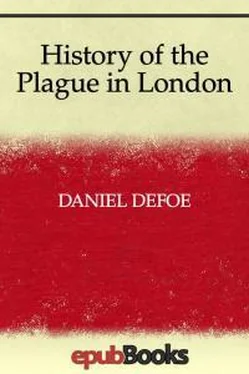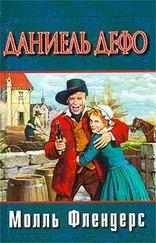Даниэль Дефо - History of the Plague in London
Здесь есть возможность читать онлайн «Даниэль Дефо - History of the Plague in London» весь текст электронной книги совершенно бесплатно (целиком полную версию без сокращений). В некоторых случаях можно слушать аудио, скачать через торрент в формате fb2 и присутствует краткое содержание. Год выпуска: 2014, Издательство: epubBooks Classics, Жанр: Историческая проза, на английском языке. Описание произведения, (предисловие) а так же отзывы посетителей доступны на портале библиотеки ЛибКат.
- Название:History of the Plague in London
- Автор:
- Издательство:epubBooks Classics
- Жанр:
- Год:2014
- ISBN:нет данных
- Рейтинг книги:4 / 5. Голосов: 1
-
Избранное:Добавить в избранное
- Отзывы:
-
Ваша оценка:
- 80
- 1
- 2
- 3
- 4
- 5
History of the Plague in London: краткое содержание, описание и аннотация
Предлагаем к чтению аннотацию, описание, краткое содержание или предисловие (зависит от того, что написал сам автор книги «History of the Plague in London»). Если вы не нашли необходимую информацию о книге — напишите в комментариях, мы постараемся отыскать её.
History of the Plague in London — читать онлайн бесплатно полную книгу (весь текст) целиком
Ниже представлен текст книги, разбитый по страницам. Система сохранения места последней прочитанной страницы, позволяет с удобством читать онлайн бесплатно книгу «History of the Plague in London», без необходимости каждый раз заново искать на чём Вы остановились. Поставьте закладку, и сможете в любой момент перейти на страницу, на которой закончили чтение.
Интервал:
Закладка:
I had in my family only an ancient woman that managed the house, a maidservant, two apprentices, and myself; and, the plague beginning to increase about us, I had many sad thoughts about what course I should take and how I should act. The many dismal objects [128] Objects cannot very well happen. Defoe must mean, "the many dismal sights I saw as I went about the streets."
which happened everywhere as I went about the streets had filled my mind with a great deal of horror, for fear of the distemper itself, which was indeed very horrible in itself, and in some more than others. The swellings, which were generally in the neck or groin, when they grew hard, and would not break, grew so painful that it was equal to the most exquisite torture; and some, not able to bear the torment, threw themselves out at windows, or shot themselves, or otherwise made themselves away, and I saw several dismal objects of that kind. Others, unable to contain themselves, vented their pain by incessant roarings; and such loud and lamentable cries were to be heard, as we walked along the streets, that [129] As.
would pierce the very heart to think of, especially when it was to be considered that the same dreadful scourge might be expected every moment to seize upon ourselves.
I cannot say but that now I began to faint in my resolutions. My heart failed me very much, and sorely I repented of my rashness, when I had been out, and met with such terrible things as these I have talked of. I say I repented my rashness in venturing to abide in town, and I wished often that I had not taken upon me to stay, but had gone away with my brother and his family.
Terrified by those frightful objects, I would retire home sometimes, and resolve to go out no more; and perhaps I would keep those resolutions for three or four days, which time I spent in the most serious thankfulness for my preservation and the preservation of my family, and the constant confession of my sins, giving myself up to God every day, and applying to him with fasting and humiliation and meditation. Such intervals as I had, I employed in reading books and in writing down my memorandums of what occurred to me every day, and out of which, afterwards, I took most of this work, as it relates to my observations without doors. What I wrote of my private meditations I reserve for private use, and desire it may not be made public on any account whatever.
I also wrote other meditations upon divine subjects, such as occurred to me at that time, and were profitable to myself, but not fit for any other view, and therefore I say no more of that.
I had a very good friend, a physician, whose name was Heath, whom I frequently visited during this dismal time, and to whose advice I was very much obliged for many things which he directed me to take by way of preventing the infection when I went out, as he found I frequently did, and to hold in my mouth when I was in the streets. He also came very often to see me; and as he was a good Christian, as well as a good physician, his agreeable conversation was a very great support to me in the worst of this terrible time.
It was now the beginning of August, and the plague grew very violent and terrible in the place where I lived; and Dr. Heath coming to visit me, and finding that I ventured so often out in the streets, earnestly persuaded me to lock myself up, and my family, and not to suffer any of us to go out of doors; to keep all our windows fast, shutters and curtains close, and never to open them, but first to make a very strong smoke in the room, where the window or door was to be opened, with rosin [130] "Rosin" is a long–established misspelling for "resin." Resin exudes from pine trees, and from it the oil of turpentine is separated by distillation.
and pitch, brimstone and gunpowder, and the like; and we did this for some time. But, as I had not laid in a store of provision for such a retreat, it was impossible that we could keep within doors entirely. However, I attempted, though it was so very late, to do something towards it; and first, as I had convenience both for brewing and baking, I went and bought two sacks of meal, and for several weeks, having an oven, we baked all our own bread; also I bought malt, and brewed as much beer as all the casks I had would hold, and which seemed enough to serve my house for five or six weeks; also I laid in a quantity of salt butter and Cheshire cheese; but I had no flesh meat, [131] As distinguished from fish meat.
and the plague raged so violently among the butchers and slaughterhouses on the other side of our street, where they are known to dwell in great numbers, that it was not advisable so much as to go over the street among them.
And here I must observe again, that this necessity of going out of our houses to buy provisions was in a great measure the ruin of the whole city; for the people catched the distemper, on these occasions, one of another; and even the provisions themselves were often tainted (at least I have great reason to believe so), and therefore I cannot say with satisfaction, what I know is repeated with great assurance, that the market people, and such as brought provisions to town, were never infected. I am certain the butchers of Whitechapel, where the greatest part of the flesh meat was killed, were dreadfully visited, and that at last to such a degree that few of their shops were kept open; and those that remained of them killed their meat at Mile End, and that way, and brought it to market upon horses.
However, the poor people could not lay up provisions, and there was a necessity that they must go to market to buy, and others to send servants or their children; and, as this was a necessity which renewed itself daily, it brought abundance of unsound people to the markets; and a great many that went thither sound brought death home with them.
It is true, people used all possible precaution. When any one bought a joint of meat in the market, they would not take it out of the butcher's hand, but took it off the hooks themselves. [132] Defoe uses these pronouns in the wrong number, as in numerous other instances.
On the other hand, the butcher would not touch the money, but have it put into a pot full of vinegar, which he kept for that purpose. The buyer carried always small money to make up any odd sum, that they might take no change. They carried bottles for scents and perfumes in their hands, and all the means that could be used were employed; but then the poor could not do even these things, and they went at all hazards.
Innumerable dismal stories we heard every day on this very account. Sometimes a man or woman dropped down dead in the very markets; for many people that had the plague upon them knew nothing of it till the inward gangrene had affected their vitals, and they died in a few moments. This caused that many died frequently in that manner in the street suddenly, without any warning: others, perhaps, had time to go to the next bulk [133] The projecting part of a building.
or stall, or to any door or porch, and just sit down and die, as I have said before.
These objects were so frequent in the streets, that when the plague came to be very raging on one side, there was scarce any passing by the streets but that several dead bodies would be lying here and there upon the ground. On the other hand, it is observable, that though at first the people would stop as they went along, and call to the neighbors to come out on such an occasion, yet afterward no notice was taken of them; but that, if at any time we found a corpse lying, go across the way and not come near it; or, if in a narrow lane or passage, go back again, and seek some other way to go on the business we were upon. And in those cases the corpse was always left till the officers had notice to come and take them away, or till night, when the bearers attending the dead cart would take them up and carry them away. Nor did those undaunted creatures who performed these offices fail to search their pockets, and sometimes strip off their clothes, if they were well dressed, as sometimes they were, and carry off what they could get.
Читать дальшеИнтервал:
Закладка:
Похожие книги на «History of the Plague in London»
Представляем Вашему вниманию похожие книги на «History of the Plague in London» списком для выбора. Мы отобрали схожую по названию и смыслу литературу в надежде предоставить читателям больше вариантов отыскать новые, интересные, ещё непрочитанные произведения.
Обсуждение, отзывы о книге «History of the Plague in London» и просто собственные мнения читателей. Оставьте ваши комментарии, напишите, что Вы думаете о произведении, его смысле или главных героях. Укажите что конкретно понравилось, а что нет, и почему Вы так считаете.












